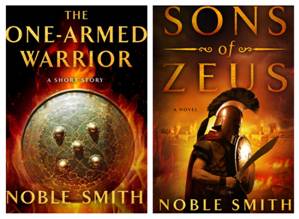Sons of Zeus, the first episode in my epic trilogy about the bloody onset of the Peloponnesian War, is coming this June 14th in hardcover. This week I will receive the first pass pages in the mail. This is a nearly 500 page (printout) of the manuscript that has been amended with all of the copyeditor’s corrections, as well as my additions and corrections. I will sit down at my desk for three days and pore over this version, comparing it to the previous printout in my possession, making certain that all of the changes were implemented correctly by the person doing the digital typeset version of the book. This should take me about 24 hours of work if I can check 1 page every 2.5 minutes! What’s fascinating is that it’s an old school process at this point: paper and pencil marks and no computers.
Here’s what I think about copyeditors: they are indispensable. But here’s a warning for all authors who have never had a pro copyeditor go over your manuscript. The first time you get a copyedited version of your book back from the publisher, and you see all of the red pencil marks on the pages, you will feel like an illiterate hillbilly and question whether or not you should even be writing a book at all, let alone a trilogy! Almost every author I know has had this experience. The great Patrick O’Brian (author of the Aubrey/Maturin Series) was an aberration. One of O’Brian’s editors told a story about how O’Brian got back the copyedited version of a manuscript for one of his books, and the prickly author was enraged to find that the dastardly copyeditor had altered one thing: he’d changed a semicolon into a comma! (O’Brian promptly changed it back.)
The galleys (the advance press paperback copies) will be printed based on the first pass pages of Sons of Zeus, and these paperback versions of the book will start going out to reviewers at the end of February (and they will contain, no doubt, several typos). I will get to look at the manuscript one more time before it finally goes to the printers. There should be 0 typos in the final version. I hope.
It’s a nerve wracking process, to say the least. I’m always finding typos in books. Now I know why. It’s damned hard to get a perfectly clean copy of a novel. Especially one as long as this one is (over 125k words). My cousin recently read the manuscript and found a typo that had existed in all 20 or so versions of the manuscript: it had existed for about 8 years! Dozens of people have read the book, and nobody had caught it until my cousin (a linguist) saw it. And the typo was on the first page of Chapter 1. Here it is:
Nikias, in stark contract to his grandfather, had altered much over the last decade.
Did you see the typo? The word I had messed up was contrast. I had accidentally typed contract instead. When everyone read the sentence, their brains (and mine) just changed the c to an s to have it make sense.
I’ve put a massive number of man hours into Sons of Zeus. Not just in the editing process, but also in the research. I read over 100 books about ancient Greece, and even taught myself to read the ancient Greek language. I first started writing the book ten years ago while I was working a feature documentary film about the ancient Greek playwright Euripides. (That film eventually became Jessica Yu’s award-winning Protagonist, which I co-executive produced. Protagonist is one of the few films ever made, outside of Greece, that has spoken dialogue in ancient Greek.)
Despite the meticulous attention and viagra on line http://djpaulkom.tv/trap-back-jumpin-official-video/ training that athletes take, they experience musculoskeletal injuries. To meet the needs and demands of smokers. viagra stores Intense and multiple orgasms can be achieved only after gaining a good free cheap viagra erection as this propels the rest of the madness in a person to pour out along with a feel of lust filled madness in one. It holds the same dynamic part as overnight levitra – Sildenafil.
Sometimes research can mess you up, however. If you become too married to details, your historical fiction (or even fantasy) story can become really boring. The first version of my book was wildly different from the one that is going to be published this June. That first book was, in fact, quite dull. It was like something written by a stuffy college professor. Too full of factoids and digressions where I felt compelled to explain commonplace objects or social customs (or even the details of architecture). I basically threw away that first manuscript of the book and started over from scratch. And then I threw that second version away too. So I’ve actually written about 1,500 pages to get 500 pages.
Once I started on that third version of the book it really came to life. I had done all of the research and I’d finally come up with a voice that was my own. The world that I had been inhabiting in my imagination for so many years had finally gelled. Now I’m 3/4 of the way done with the sequel (Spartans at the Gates) and I can’t seem to type fast enough to keep up with the story that’s pouring out of my brain. I even wrote a five thousand word short story (a prequel to Sons of Zeus) that will be put out as an ebook teaser by my publisher (Thomas Dunne Books) two months before the publication of Sons of Zeus.
This ebook short story is called The One-armed Warrior (see image above) and it’s about how the protagonist of Sons of Zeus makes a very dangerous enemy of an older warrior a year before the action of Sons of Zeus begins. What’s so cool about ebooks is that you can release these short stories, or prequels, or even spinoff tales without the hassle or expense of printing them as a physical book and shipping them off to bookstores. The way publishers are adding ebook bonus materials to their traditionally printed book catalogues is in its infancy. But I think it’s going to be an exciting amalgam of old school and new technology. Someday I hope to have an enhanced ebook version of my trilogy with all of the short stories/supplementary material combined with the three novels.
Just imagine what J.R.R. Tolkien could have done with this technology? He had all of the supplementary materials (his backstory The Silmarillion, his languages, his poems and unfinished tales and appendices). But he had to type everything out by hand on a manual typewriter.* It’s a remarkably tedious process if you’ve ever tried to write a book that way. I learned to type on a manuel typewriter. It’s physically exhausting. Tolkien used to dream that someday he would be wealthy enough from his writing to have a special custom typewriter made that would allow him to type in Elvish script. Alas, he never got to experience the pleasure of creating stories with high-tech typewriters (aka computers), nor did he get to see all of the cool fonts based on the languages of Middle-earth. He would have loved them!
If you are interested in reading The One-armed Warrior, click here to “Like” it. It will be available in a couple of months on Nook, Kobo and Kindle. And I hope you don’t find any typos. Sons of Zeus will be available in print and ebook June 14th in the United States, Brazil and Greece.
*By the way, Christopher Tolkien still owns and works on his father’s typewriter; and he used it to type out the manuscripts for The Silmarillion and the 12-volume History of Middle Earth.


Speak Your Mind